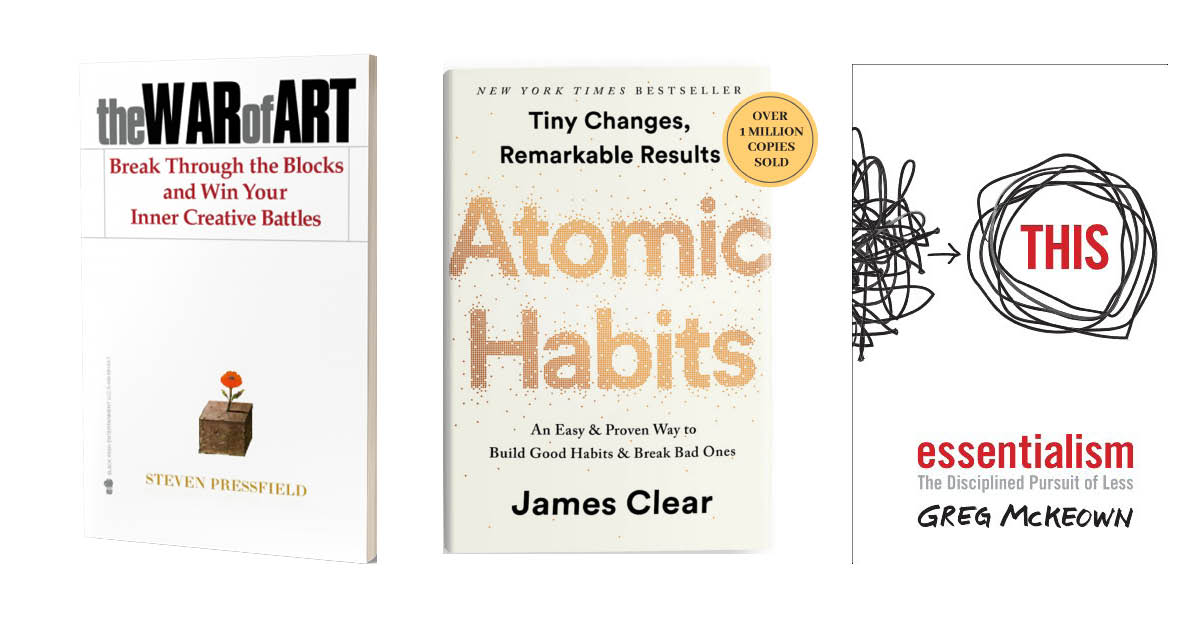3 Books for Crushing It in the Practice Room, and in Life

1. The War of Art by Steven Pressfield
“Resistance cannot be seen, touched, heard, or smelled. But it can be felt. We experience it as an energy field radiating from a work-in-potential. It’s a repelling force. It’s negative. Its aim is to shove us away, distract us, prevent us from doing our work.”
It’s easy to get distracted. I’ve been distracted by outside noise in writing this sentence. Everything seems designed to distract us. That’s what the entire discipline of marketing is for–to distract the potential user or customer. Google and Facebook are companies that literally pay engineers, psychologists, and etc. to find new ways of grabbing and making use of your attention. Other things do it too–our desire for attention, affection, recognition, and so on and so on ad infinitum.
The War of Art is antidote to that. If we want to succeed in the arts, in business, in life, we must control the resistance that surrounds us. This resistance is “any act that rejects immediate gratification in favor of long-term growth, health, and integrity.”
We can choose to put our higher nature (art, creativity, health, etc.) first and make it truly great, or we can give in to our lower nature (everything else). The choice is yours.
2. Essentialism by Greg McKeown
“Which problem do you want?”
It is so easy to try to be a hero and do everything. We need to own up to simple fact that multitasking is not a skill. In is even harmful. Why? Because being truly great means a total focus. Do you think Tom Brady has 6 Super Bowl rings because he’s signing endorsement deals at practice? Absolutely not. He is completely committed to the physical health, tactical strategy, and leadership necessary to win games and championships.
This total focus on the essentials is the defining thesis of Essentialism. This book forces us to look at what is truly essential. The simple fact is: you can’t have it all. You can’t spend all of your time at work, with your friends and family, playing baseball, and be the principal violinist of a symphony. You can’t be an incredible parent if you’re devoting 100 hours a week to launching an IPO of a new startup. You can’t travel 52 weeks a year and run 5 miles 5 days a week.
Now you might say that it is in fact possible to do all of those things. Of course it’s possible! But is it possible to truly do them well? No–not unless your Dr. Manhattan.
If we want to be truly great at something, we need define what it is and make that essential to our life. For someone looking to make it as a musician that means asking questions like “do I really want to be great at playing this instrument? Am I willing to make sacrifices in other areas of my life to become to best musician I can possibly be? Can I explain to my friends that I can’t text them while I’m practicing?” If the answer is unclear, you need to think through it and ask questions until it is.
3. Atomic Habits by James Clear
“The ultimate purpose of habits is to solve the problems of life with as energy and effort as possible.”
Great musicianship is a habit. You don’t show up to rehearsal, a performance, or a recording session and automatically become better at the instrument. You show up and do what you’ve practiced. If you practice poorly, you will perform poorly. If you practice with mastery and artistry, you will perform with mastery and artistry.
Our performance is a series of habits. Something as simple as showing up everyday on time ready to work is a good habit. Snapchatting all day is a bad habit. Practicing at the same time everyday is a good habit. Practicing without a plan is a bad habit. Meditating everyday is a good habit. Going to bed late is a bad habit. Habits can be good or bad–it doesn’t matter. What does matter is implementing good habits in the pursuit of our goals. We can continue our bad habits and let them control our life.
Atomic Habits gives you an in-depth look at what habits are, how to make good habits, and how to dispose bad habits. It does this through the power incentive. Incentivize good habits and they will become permanent habits. Disincentivize bad habits and they will disappear. It also goes through to social stigma of living with bad habits and provides great models for building a social environment that will help you develop good habits.
Ultimately, we are our habits: good or bad.

No Comments